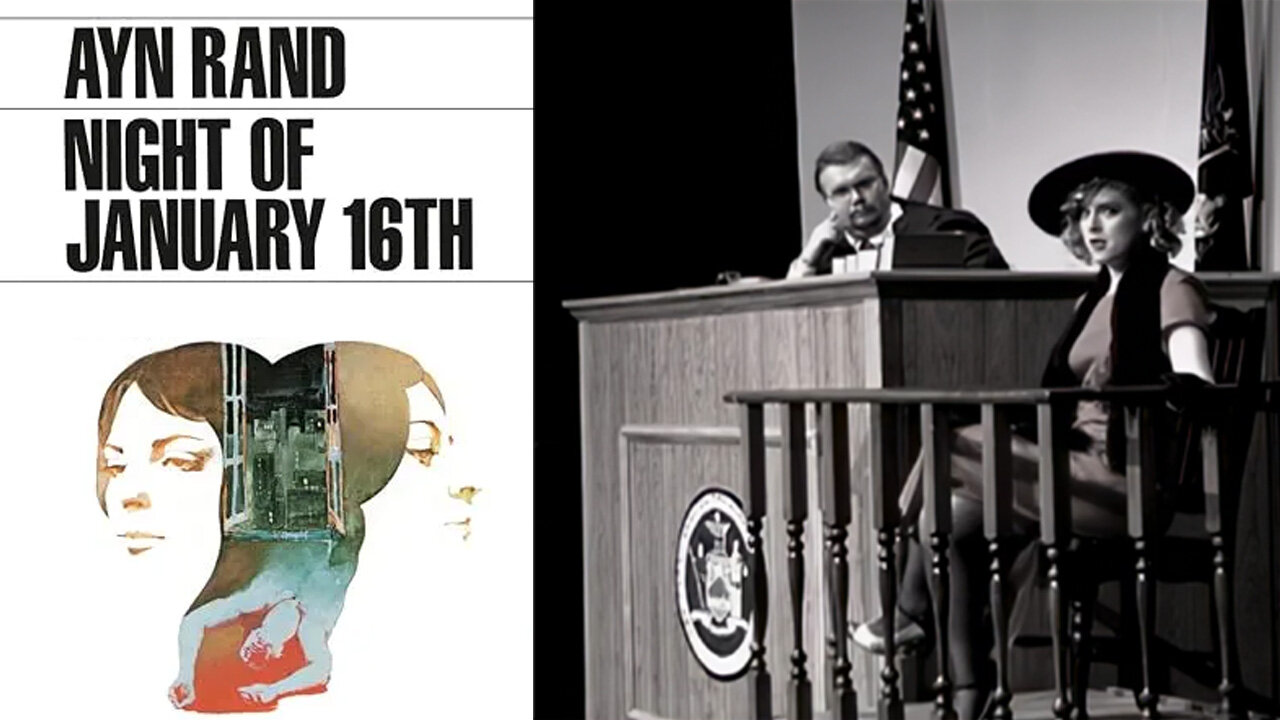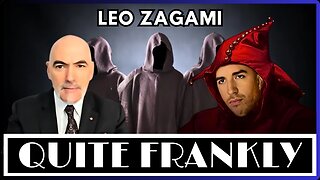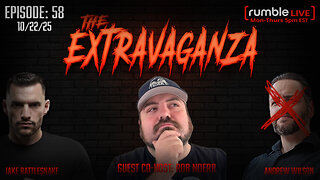Premium Only Content

'Night of January 16th' (1934) a Play by Ayn Rand
'Night of January 16th' is Ayn Rand’s dramatic exploration of individualism and moral ambiguity.
The play is a courtroom drama that straddles the boundary between entertainment and philosophical inquiry. Written early in her career, the play is often seen as a precursor to the larger themes that would dominate Rand’s later works, such as The Fountainhead and Atlas Shrugged. While not as overtly ideological as her novels, the play reveals the seeds of Rand’s philosophy of Objectivism, particularly her emphasis on individual moral judgment, the nature of justice, and the conflict between the independent thinker and societal norms.
At its core, 'Night of January 16th' is a murder trial. Karen Andre, a former secretary and lover of the enigmatic financier Bjorn Faulkner, is on trial for his apparent murder. The courtroom is the entire setting of the play, and the audience is placed directly in the role of judge—literally. In a groundbreaking theatrical device, Rand allowed each night's audience to provide twelve members to serve as the jury, whose verdict of guilty or not guilty would determine which ending the actors performed. This choice wasn't merely a gimmick; it served as a profound expression of Rand's belief in individual moral agency and the variability of justice depending on the values of those who render it.
What makes the play notable—beyond its interactive structure—is the way it presents characters not as static heroes and villains, but as morally complex individuals. Karen Andre is at once passionate, loyal, and ruthless. She refuses to conform to the polite expectations of society or the black-and-white thinking of the courtroom. Bjorn Faulkner, though absent in the play’s present, is fleshed out through testimony as an equally ambiguous figure—part visionary entrepreneur, part criminal, depending on who describes him. Their relationship defies convention and legality, but Rand seems to suggest that its intensity and commitment might contain a truth deeper than law can comprehend.
Rand’s play subtly critiques collectivist and conventional notions of morality, implying that truth and virtue are not always aligned with legality or social acceptance. The spectators—serving as jury—are confronted with this dilemma: do they convict Karen for violating law and tradition, or do they absolve her for being loyal to a personal and perhaps admirable code? Rand uses the courtroom as a metaphor for society itself, where appearances, norms, and public opinion often obscure more complex truths.
From a dramatic standpoint, 'Night of January 16th' is tightly constructed and theatrically engaging. It maintains a fast pace through testimony, cross-examinations, and verbal confrontations, building a strong sense of suspense. The characters—especially Karen Andre—are sharply drawn and often compelling. The play's strength lies not just in its novelty or message, but in its craftsmanship as a piece of theatre.
Yet, some critics have observed that 'Night of January 16th' does not fully deliver on the philosophical weight that Rand would later become known for. Because it is an early work, it reflects a dramatist still honing her voice, and its ideas are more implicit than explicit. Those familiar only with Rand’s later polemical style may be surprised at the relative subtlety here. But that may be its strength—it allows the audience to engage with questions of justice, morality, and independence without being explicitly lectured.
In retrospect, 'Night of January 16th' is a fascinating and innovative piece of theatre that illustrates Rand’s early preoccupation with themes of individual judgment, loyalty to values over rules, and the collision between the personal and the institutional. It’s a play that forces the audience to confront their own beliefs, not just about the characters on stage, but about the very nature of justice itself.
Conclusion
Ayn Rand’s 'Night of January 16th' is more than a courtroom drama—it is a participatory moral inquiry. While it lacks the grand philosophical declarations of her later novels, it shows Rand at her most theatrical, crafting a suspenseful story that invites the audience to wrestle with real ethical complexity. For Rand, the question was never merely "Did she do it?" but “What is justice?”—and she left the answer up to us.
-
 LIVE
LIVE
Side Scrollers Podcast
3 days ago🔴FIRST EVER RUMBLE SUB-A-THON🔴DAY 3🔴PLAYING MIKE TYSON'S PUNCH OUT TILL I WIN!
1,323 watching -
 LIVE
LIVE
Quite Frankly
5 hours agoVatican Rumors, Demon Hunting, Spooky Extras | Leo Zagami 10/22/25
550 watching -
 LIVE
LIVE
The Mike Schwartz Show
2 hours agoTHE MIKE SCHWARTZ SHOW Evening Edition 10-22-2025
3,573 watching -
 1:27:14
1:27:14
Kim Iversen
3 hours agoCBS Boss Colluded With Israel to SPY on Americans | Trump Keeps Bombing Fisheman
34.5K78 -
 1:02:18
1:02:18
TheCrucible
2 hours agoThe Extravaganza! EP: 58 with Guest Co-Host: Rob Noerr (10/22/25)
54.5K7 -
 LIVE
LIVE
StoneMountain64
6 hours agoBattlefield 6 New Season Details NO 'BR' MENTIONED YET
42 watching -
 17:47
17:47
Bearing
11 hours agoThe Most ANNOYING Podcast EVER 💥 ROSIE O’DONNELL & ABBIE CHATFIELD Whinge About EVERYTHING 🤡
5.24K22 -
 LIVE
LIVE
GritsGG
4 hours agoRanked Top 70! Most Wins in WORLD! 3744+!
64 watching -
 1:52
1:52
NAG Daily
4 days agoTHE BIGGEST CREATOR COLLAB SHOW ON RUMBLE W/GreenMan Reports
4.81K2 -
 LIVE
LIVE
Tundra Tactical
3 hours ago $5.08 earnedProfessional Gun Nerd Plays Battlefield 6
112 watching